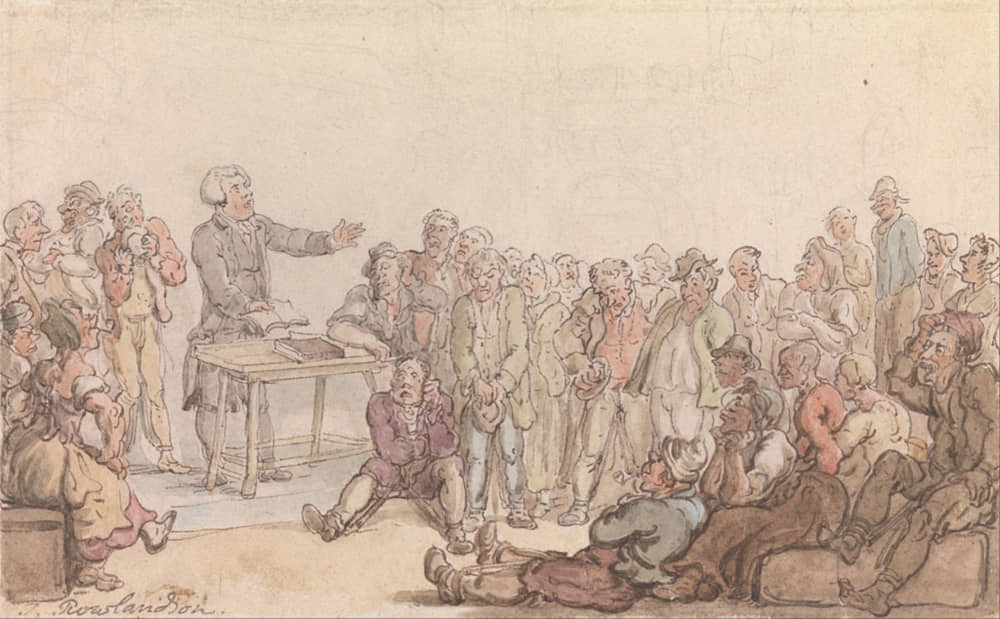In this monthly address to the Postil Magazine, I will skate on thin ice and dwell for a little while on the wise invocation in the Lord’s Prayer: “Lead us not into temptation.” Temptation is a universal sentiment. There’s even a rather fine American soul group named after it. So, to quote one of their hits, “Get ready” for my sermon (what a swinging rector I am!). I myself confess I feel a pang of temptation as I pass any attractive patisserie and ogle the cream-cakes, eclairs and of course the strawberry tarts. “Naughty but nice” was the clever slogan of the English Dairy Board in the 1970s, urging us on to lick whipped cream. I don’t mind if I do!
Others, however, are led into temptation in the slightly lower, indeed baser bodily organs. The ice is now very thin, I am sailing close to the wind and the time is nigh to come clean. I confess that even a chaste soul such as myself feels a veritable pitter-patter at the thought of the Spice Girls who we see in their pomp below—the stately Posh, that scrumptious bombshell Baby Spice; now, where are my Yardley smelling salts? That’s better! Thank heaven the girls are now spoken for and married, leading I naturally hope, good Christian lives as wives and mothers.

● ● ●
It was the great Cardinal Hume—there is some good within the Roman fold I hasten to add—who advised his readers to “bite your tongue and say thanks be to God!” when you are saddened, maddened or both. For my part, I have bitten mine, indeed risked chewing it to shreds, when led into temptation—but thank goodness, that vital organ is still intact and in a position to lick and then masticate soft eclairs. I know I am in good company—St. Jerome, famously, went a lot further than me and retreated into the wilderness with his cuddly lion companion when tempted by the Spice Girls of his day, though they were scantily clad dancers rather than those superb singers.
A very great cleric of the 19th century, the Revd. F.W. Farrar, addressed the theme of bodily temptation and growing self-fulfilment, shall we say, with candour, beauty and integrity in the headmaster’s sermon in his classic novel Eric, or Little by Little (1858). It behooves me to quote him at length:
Kibroth-Hattaavah! Many and many a young Englishman has perished there! Many and many a happy English boy, the jewel of his mother’s heart—brave and beautiful and strong—lies buried there. Very pale their shadows rise before us—the shadows of our young brothers who have sinned and suffered. From the sea and the sod, from foreign graves and English churchyards, they start up and throng around us in the paleness of their fall. May every schoolboy who reads this page be warned by the waving of their wasted hands, from that burning marle of passion where they found nothing but shame and ruin, polluted affections, and an early grave.
● ● ●
Wonderful stuff, putting Hazard to shame! Though Farrar piles on the agony, he strangely failed to mention the blindness that is a well-known symptom of Kibroth-Hattaavah Syndrome. Yet his point is well made. What are the deterrents to contracting this hideous condition and resting prematurely in the churchyard of his vivid description? I would recommend a lot of good, hard praying; listening to classical music rather than to the Spice Girls; and something that my parishioner Leslie Broadbridge would recommend, dipping into your father’s back numbers of Wisden’s Cricketers’ Almanac, studying the utterly absorbing County Championship scorecards of the 1950s in the happy knowledge that Surrey usually won. I am open to alternative suggestions. Digging the Revd Hazard’s rose garden is a further, excellent remedy—any lucky lad in this position will earn a shining shilling and a toffee-apple for his pains, and that’s a promise!
Maintaining this risky theme, I will move on to something almost equally disturbing. Let me introduce it by recalling my own, impious youth. As a 10- or 11-year-old, having been inducted, in the classroom of my private school I hasten to add, in what was then nicely termed “the Facts of Life,” I used to get a rise out of asking conservative Radlett folk of a certain age: “What is your stand on sex before marriage?” It never failed to produce mirth for those who could stand their ground or, still more appealing to the devilish young Hazard, adult embarrassment, prevarication and even momentary rage. I was, I now realise, revelling in the permissive Zeitgeist of the 1960s. Blessed with liberal parents, I was never spanked or worse for such outrageousness.
So, what is my stand on S & M, as it were, now that I myself have attained the maturity of the adults that I had teased? “You young whippersnapper!” would probably be my chaffing response, but how should I guide my slightly older parishioners, or indeed my Confirmation class who are less confrontational than Master Hazard but equally intellectually curious? I would stress, of course, the significance of continence and restraint, and the sanctity and beauty of matrimonial bonding and attendant family life as a reward for this.
But suppose a Confirmation student, not content with this, pressed the issue? “Young Ambrose, you don’t give up easily,” I would chide gently, “But since you raise the question, intercourse prior to matrimony could well produce a bastard!” Cue for Farmer Brown’s gormless son to chip in “But Sir, my Dad was married for five years before I was born!” “Brown Minor, being a bastard is not necessarily predicated on one’s birth or even marital status!” Oh my gosh, I hope he won’t tell Pater: in retrospect I was shrewd to use complex words like “predicated” and even “marital status.” With any luck, these will probably trip up Master Brown—he certainly appeared rather baffled. A close shave, and it only goes to show how posh, affected prose is a wonderful weapon of defence against simpletons. That excellent Conservative politician Jacob Rees-Mogg knows this too, and what an admirable successor to Boris he would make…
Well, I think I have handled three hot potatoes with some aplomb: it’s surely time for a certain Reverend Gentleman to enjoy his first gin and tonic of the day…
Mark Stocker is an art historian whose recent book is When Britain Went Decimal: The Coinage of 1971. Any perceived resemblance between him and the Revd. Septimus Hazard is but a figment of the reader’s imagination.
Featured: “The Vicar of Wakefield: The Vicar Preaching to the Prisoners,” by Thomas Rowlandson, ca. 1817.
